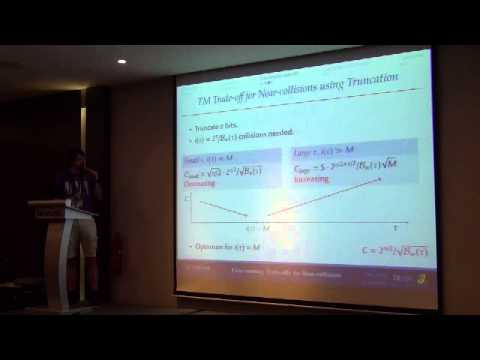Welcome to the resource topic for 2012/731
Title:
Time-memory Trade-offs for Near-collisions
Authors: Gaëtan Leurent
Abstract:In this work we consider generic algorithms to find near-collisions for a hash function. If we consider only hash computations, it is easy to compute a lower-bound for the complexity of near-collision algorithms, and to build a matching algorithm. However, this algorithm needs a lot of memory, and makes than 2^{n/2} memory accesses. Recently, several algorithms have been proposed without this memory requirement; they require more hash evaluations, but the attack is actually more practical. They can be divided in two main categories: some are based on truncation, and some are based on covering codes. In this paper, we give a new insight to the generic complexity of a near-collision attack. First, we consider time-memory trade-offs for truncation-based algorithms. For a practical implementation, it seems reasonable to assume that some memory is available and we show that taking advantage of this memory can significantly reduce the complexity. Second, we show a new method combining truncation and covering codes. The new algorithm is always at least as good as the previous works, and often gives a significant improvement. We illustrate our results by giving a 10-near collision for MD5: our algorithm has a complexity of 2^45.4 using 1TB of memory while the best previous
ePrint: https://eprint.iacr.org/2012/731
Talk: https://www.youtube.com/watch?v=ViBe1ox2nQo
Slides: https://iacr.org/cryptodb/archive/2013/FSE/presentation/25050.pdf
See all topics related to this paper.
Feel free to post resources that are related to this paper below.
Example resources include: implementations, explanation materials, talks, slides, links to previous discussions on other websites.
For more information, see the rules for Resource Topics .
